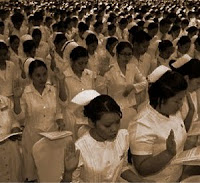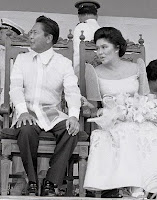Pinoy-style corruption: in need of a bit more understanding
 Below is the content of a comment I posted on AntiPinoy.com in response to some feedback on my article What it means to fulfill a promise to "eradicate corruption". In it I go into further detail to show that "corruption" is a beast that has its roots in a more entrenched property of Philippine society -- lack of trust. Filipino-style corruption also has the unfortunate characteristic of being chaotic and, as such, defies any possible effort to incorporate it as a manageable risk in one's business. Thus a thesis that it is Filipino-style corruption being chaotic and not its mere existence that hinders progress -- invalidating the premise of corruption being directly tied to poverty in the simplistic manner that it is pitched in most two-bit campaigns.
Below is the content of a comment I posted on AntiPinoy.com in response to some feedback on my article What it means to fulfill a promise to "eradicate corruption". In it I go into further detail to show that "corruption" is a beast that has its roots in a more entrenched property of Philippine society -- lack of trust. Filipino-style corruption also has the unfortunate characteristic of being chaotic and, as such, defies any possible effort to incorporate it as a manageable risk in one's business. Thus a thesis that it is Filipino-style corruption being chaotic and not its mere existence that hinders progress -- invalidating the premise of corruption being directly tied to poverty in the simplistic manner that it is pitched in most two-bit campaigns.@ MorgaHe cut the complexity of human nature and the black hole that is Philippine bureaucracy into Nonoy = Good, Zero Corruption and Gloria = Evil, 100% Corruption. He did not leave room for an escape clause. Now his handlers are on damage control, and will probably get the full cooperation of the yellow media.
Indeed, that's so unlike the way, say, a weight loss product may "promise" results but always end its pitch with the caveat "combined with the proper diet/exercise regime". Noynoy was probably so caught up in winning the election that he forgot (or, more likely just outright failed) to consider what happens if he does win.
But yes, everything's on record.
- Failure to come up with a proper platform - 1 peso
- Painting himself into a corner with moronic promises during the campaign - 5 pesos
- Watching the intelligentsia take him up on the above two over the next several years - Priceless
@ ricelanderI do not quite follow your line of argument. It’s like saying, the sonofabitch stole from me because I did not trust him with the key to my vault.
The thesis around how a fundamental lack of trust in Pinoy society underpins its inherent predisposition to corruption focuses on how the convoluted check and balances in many processes and approaces to doing things in the Philippines makes the place fertile breeding ground for corruption. Convolusion and complexity creates a market for fixers and those who peddle shortcuts in return for financial compensation -- in short, bribery becomes an economically viable cost to businesses and private citizens when seen in the conext of the alternative, which is doing business by the book and sustaining the cost of navigating an unnecessarily draconian or onerous system. Why subject one's self to that if there is a quick fix or shortcut for X amount of pesos.
It's a vicious circle then -- a society of people who see each other as someone out to put one over you will apply extra measures to fraud-proof a transaction with the other (at the cost of extra steps and control measures built into said transaction). In my old Trust article, I quoted something Lichauco wrote that captures the essence of what I just said above:A nation whose policies and rules are based on the assumption that everybody is a cheat and liar unless proven otherwise cannot long endure. Take a close look at our bureaucracy and its rules. It is burdened by elaborate and often unnecessary checks and balances so that nothing ever gets done in the process.
And in my book, I make a more precise framework to describe this concept:Each of these three examples represents the three key enablers to developing a cohesive and productive society – security, empowerment, and access. Without security there can be no openness. Without empowerment, there can be no efficiency. Without access there can be no simplicity. A society where everything is closed, inefficient, and complicated is fertile breeding ground for corruption.
Kung baga,
We need to aspire for a society of people [who] perceive themselves as enjoying a quality of life described fundamentally as:
- Secure;
- Empowered; and,
- Accessible
... without which components of the system cannot be made:
- Open (for fear of security breaches and incidences of fraud);
- Efficient (because unempowered people cannot be given greater responsibility); and,
- Simple (because a lack of straightforward access makes navigating a system or process necessarily onerous).
... all of which makes bribery a more appealing option to take for users/patrons of the country's systems, processes, and institutions.
It also explains the continued reliance on family networks to get things done and further one's career. The system fails to present itself as a reliable source of security, empowerment, and accessibility. As a result, Pinoy see their family connections as the only passport to success in our primitive society. Compare that to how individual migrants are able to strike it out on their own in advanced societies with only state facilities (initially) to rely on.
Opportunity and law enforcement are factors, but they should be seen only as flow-on measures. The underlying core of a truly just and transparent society lies in the very nature of the way things are set-up and the regard for one's place in the community. That is something that cannot be solved by law enforcement -- but only through a really deep understanding of the fundamental rot of the very DNA of Pinoy society -- its culture.
All roads ultimately lead to it. :D
It is consistent to that insightful question Mr helios proposes that the Pinoy ask him/herself:
Does corruption offend us?
Mr helios is on the right track as he elaborates thus:Corruption may sometimes actually help an economy. Corruption may actually provide a loophole for a policy/system that is actually flawed, e.g. business registration, a good entrepreneurial venture might find it hard for its business to take off bec of the difficulty of having his business registered so the individual might just offer bribes in order to expedite his registration (pardon the crudeness of my example). So corruption in this sense may actually be good, although it does beg the question that this practice encourages more of it.
I agree when we consider the quality of the sort of corruption seen in the Philippines, which is of a form that even in its criminal nature fails to meet the standards of organised criminality. So even in taking the same regard that helios sees it, Pinoy-style corruption is THIRD-RATE by the standards of the endemically corrupt. This counter-intuitive idea is something I explore in an old FV article of mine, The elegant beauty of corruption, where I write:Even in the business of corruption, Filipinos are third-rate.
Although the Philippines ranks way up there along with Angola in the business of corruption, we are not exactly famous for turning criminal activity into a world-class management "science" the way the Italian, Russian, Chinese, and Japanese mobs have. Where there is "science" and structure, there is stability and predictability. And guess what, stability and predictability happen to be music to the ears of people we need the most: investors.
Our talent for shortsightedness extends beyond our efforts at legitimacy and well into our culture of crime!
Investors, on the other hand, are forward-looking and as a matter of habit routinely assess a prospect’s risk outlook. Corruption is merely another parameter used to assess risk. And wherever there are unpredictable and volatile parameters, risk goes up and the sex appeal of the investment prospect goes down.
This is actually a sort of "Plan B" to the likely scenario that any moronic initiative to "eradicate" corruption will simply fall flat on its face every time.
If we cannot eradicate corruption, then at least we should stabilise it so that business can incorporate it into their operating model and cost structure as a managed risk.
Risk Management 101 there.
Plan B basically is for us to learn how to live with Pinoy-style corruption in a manageable way even as we strive to reduce poverty by achieving economic progress. As economic progress kicks in and touches more Filipinos, then the less counter-intuitive idea that increased wealth may eventually reduce a need for Filipinos to be corrupt may start to become more relevant.




Comments
Post a Comment